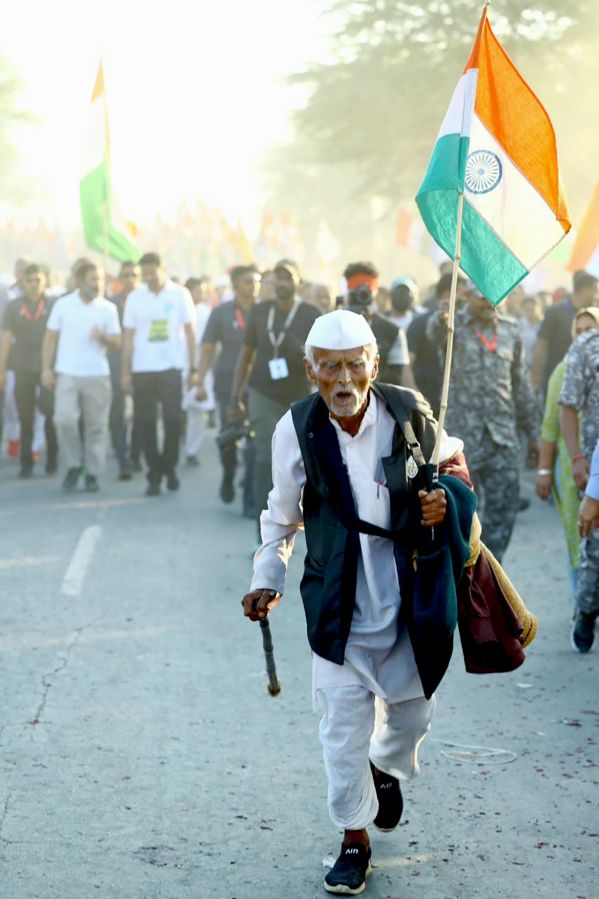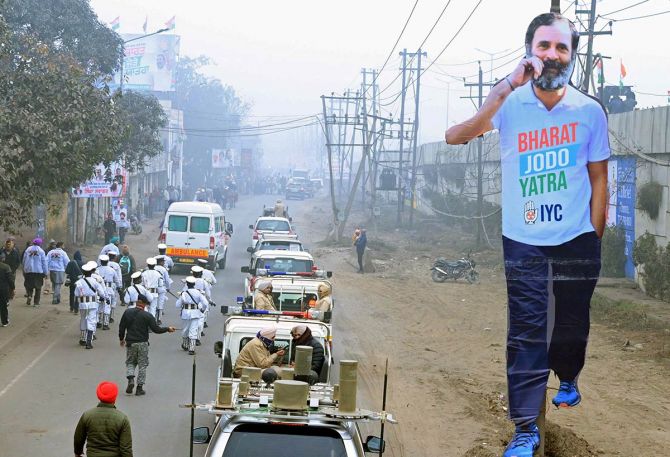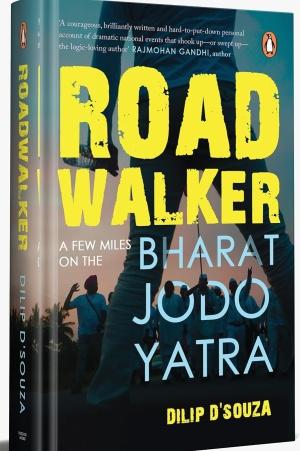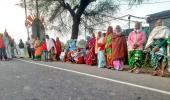There they were, showing the world that there are still people motivated not by religious structures, not by past glories, not by hatreds deliberately stoked.
These were ordinary folks doing something extraordinary purely because they think that effort might shake a nation out of a spiralling miasma of division, mistrust, cynicism, sophistry and violence.
A fascinating excerpt from Dilip D'Souza's book, Roadwalker: A Few Miles on the Bharat Jodo Yatra.

I had reason to feel kindly towards Neelotpal. Nearing Lalsot in Rajasthan, this tall young man in glasses was striding along beside me.
His pace itself pushed me to speed up slightly -- was I going to let a young upstart upstage me? Never! We didn't exchange a word, though, until -- like so often -- the next break for chai.
That time, we were sitting together on a charpai, one of those that are already low and strung so loosely that you sink even lower into it.
Couple that with the stiffness from three hours walking, and I drank my chai wondering whether I would be able to rise at all, let alone fight off possible upstages.
But Neelotpal and I introduced ourselves and spoke about this and that, particularly his once-membership in, and current disillusionment with, the Communist Party of India.
Later, I got back to walking before he did. But just as I was getting into my rhythm again, he ran up from behind and fell in beside me.
'I didn't realize till I looked you up on Google -- I've actually read one of your books!' he exclaimed.
Yes, I felt very kindly.
Neelotpal was a Pradesh Yatri and wore a badge around his neck that said as much. The label meant he was part of the Yatra while it was in the state -- the fourteen days in Rajasthan, in this case.
Speaking to him on the phone, months later, he told me how he got selected to be a Pradesh Yatri.
'I applied, and there were three days of tests,' he said, and I thought: 'Three days! That's some rigour in selection!' But as I was about to ask what the three days of testing involved, he said: 'All of us who had applied were interviewed, and it took three days to finish the interviews.'
Ah. Not quite the impression I first had in my mind. His own interview, on the second day, lasted just minutes. An 'ex-army' man asked him, it's fourteen days in Rajasthan, do you think you will be able to walk?
Neelotpal said 'yes' and just like that -- so he says -- he was Pradesh Yatri #553 of about 2000 thus selected in Rajasthan.
To be fair, he noted that some of the others did have more rigorous interviews, particularly after they seemed a little unsure of their ability to walk 25 km a day for fourteen days. But Neelotpal's immediate confidence spoke well for him.
So yes, Neelotpal was in the Communist Party 'long back'. I interrupted to ask, 'How long ago do you mean?'
In his second year in college, 2019. 'Not that long ago!' I protested. 'Oh no,' said Neelotpal. 'When you're twenty five years old, four years is a long time!' Hard to argue that point.
In any case, at that time he saw himself as a 'hardline Marxist-Leninist' and felt an 'intellectual attachment' to the CPI.
What he meant was, he was not temperamentally an activist but felt an ideological thread connected him and the party.

Only, once he joined the party, that connection crumbled: 'I changed completely to a total anti communist.' What were his reasons? The communists, he found, were stuck in a time warp of their own making, borrowed from far-off countries and long-ago texts.
They had no idea of the India of today, nor how to tailor their thinking to the India of today.
Theirs was an ideology based on books, and those too dating 'from the 1840s!' In no way was it relevant in the India of the twenty-first century. His six months as a member cured him of his 'hardline' Marxism.
I couldn't help asking: for him, was it the ideology that was at fault? Or was it the party that did not adhere to, or advance, the ideology? In other words, could Marxism indeed be relevant in India today?
'Well, anything can be made relevant,' Neelotpal replied, 'if people are open and willing to adapt. But that may not be Marxism.'
So how would he, this lapsed and disillusioned Marxist, characterise his thinking today? In line with the ideas of Mohandas Gandhi and Jawaharlal Nehru, he said.
They crafted a broadly liberal, secular nationalism. Unfortunately, that has been warped over the years.
According to him, Indira Gandhi tried to 'compromise with the communists' when she was prime minister, and that ruined the ideology that shaped the freedom struggle.
He is drawn to figures such as Ram Manohar Lohia and Jayaprakash Narayan, for the socialism -- not communism -- that they articulated.
These were 'arch nationalists', not influenced by goings-on in Vietnam or Cuba, but by entirely Indian concerns: 'Garib aadmi hai, usko roti de do pehle' [If there's a poor man, give him something to eat first].
For Neelotpal, this reflects Gandhi's view of the poor and how the country should treat them: 'Gandhi was the most revolutionary of all our leaders.'
In any event, when he moved away from communism, Neelotpal naturally gravitated towards the Congress, even though today's Congress is 'not Gandhian at all'.
He sees himself, therefore, as only a 'tactical supporter' of the party. It's in that context, if you like, that he first heard about the Bharat Jodo Yatra.
As an effort at mass contact, it seemed very Gandhian to him, and the first effort like that in a very long time.
Besides, the Yatra made a point of suggesting that if you were not part of any group, you were welcome to join up as individuals.
That was another reminder of Gandhi and his focus on individual action and change.

All of which was part of Neelotpal's decision to join the Yatra on the night it entered Rajasthan, ready to walk for the next fourteen days. How ready? He had with him his phone, a book and a notebook, a few clothes, a water bottle and some dry fruit. Which book? Lucius Annaeus Seneca's Letters from a Stoic.
Quite a choice, for leisure reading while walking 300- plus km! But an inspired one.
At the end of his third day on the Yatra, it was a very cold night -- December in Rajasthan -- his sandals were ruined, and his legs and feet were in pain from the unfamiliar exertions.
He turned that night to Seneca's letters. One suggested that real terror comes from thinking about your problem.
Don't, and the problem shrinks. 'We suffer more often in imagination than in reality,' wrote Seneca.
That night, 'his book gave me great solace,' Neelotpal said -- and after that, the rest of his time on the Yatra went smoothly.
Not that this tactical supporter was pleased with everything about the Yatra.
On his second day, for example, he found that a number of local Congress leaders had arrived to join it, all in their cars and wanting to travel in them, and yet all desperate to be seen with Rahul Gandhi.
In that moment, he saw some truth in what he called the darbari culture that the Congress is often accused of nurturing: That some members of the party want only to get close to the leaders and keep others away.
But there were also people who had been in the party for years who were simply walking, not trying to be noticed in any way.
That spirit was encouraging. 'Nobody talks about the party's devoted cadre,' Neelotpal said.
Particularly moving was eighty-eight-year-old Karuna Prasad Mishra, bent over but walking steadily. On one of those days in Rajasthan, Mishra's bag was stolen. Neelotpal bought him a shawl.
All in all, the Yatra taught Neelotpal plenty about the diversity in his own state: The dialects, behaviours, food and more.
It also changed his perspective on politics. He wants to be involved in some way -- if not electorally, at least in activist politics.
I was left thinking about something else Seneca wrote:
'It is a rough road that leads to the heights of greatness.'
****
An example of the many whom I met and walked with. In them, like in the rest, there was a nearly visible determination and purpose in manner, in their approach to the Yatra.
In fact, to me that seemed almost the 'why' of their walking. That is, here they were, showing the world that there are still people motivated not by religious structures, not by past glories, not by hatreds deliberately stoked.

No,
Some might disagree about the contours of that miasma, sure.
Some might disagree that this Yatra will actually produce such shaking, certainly. But what's hard to disagree with is the simple, yet clear like the blue sky, sense of purpose in the folks participating in the Yatra.
And that's even before mentioning those who were not walking.
Meaning, the crowds we passed everywhere: smiling, waving, wanting to shake hands, cheering.
Babies in arms, adults in their most colourful clothes, kids squealing in delight as I photographed their colourful sandals, women who looked close to ninety ... There's plenty to be said for perspective that time and distance allow, but right there and then, it was hard not to think that the Yatra was reaching out to touch Indians in unexpected ways.
As another usually sceptical friend commented, 'Surprisingly, the Yatra seems to be making headway in the right direction!'
And Rahul Gandhi? As central as he was to the Yatra, there was also a sense that in the end, its real message was larger than him.
Instead, it is about hope and optimism in India; in the India our remarkable Constitution promises.
So yes, what was the 'Bharat jodne ka plan' the Congress had?
As I saw it during the Yatra: First, stand up to those who would break this country.
Second, listen fully and sincerely to people speak about their concerns: education, health, women's issues, jobs, inflation, whatever.
Third, lay out the Congress's own plans to address such concerns. Its own vision for the country.
Excerpted from Roadwalker: A Few Miles on the Bharat Jodo Yatra by Dilip D'Souza, with the kind permission of the publishers, Penguin Random House India.
Photographs curated by Manisha Kotian/Rediff.com
Feature Presentation: Rajesh Alva/Rediff.com










